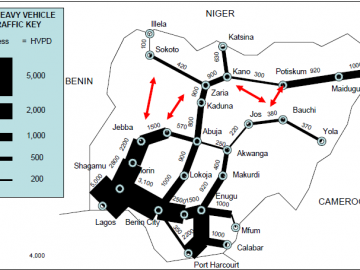The World Bank and the African Development Bank (AFDB) have been working hand in hand both in terms of monetary support to the Federal Road network. The World Bank has provided billions of Naira for the rehabilitation and maintenance of all Federal Roads and federal highways. But the truth is that with all the provided intervention, it has not solved the problem of bad roads in the country, the problem is gross lack of Economic Prioritization and Financial Idiocy. When was the last time a thorough economic analysis was carried out to justify any federal road construction in Nigeria. There is a need, as the first step to any road infrastructure project, economic and social assessment review; this is to ensure the proposed expenditure and that the country is getting the desired value for money spent.
There were so many egocentric reviews of road programme for construction before now. You cant complain, because the truth is that data is not available to permit the roads to be prioritized in an economical manner, the solutions most times are administratively rather than economically determined. This is the more reason why the right Highway engineers, Quantity surveyors and Economists should be involved in the collection and analysis of data on traffic volumes, road inventory and condition, with review of design standards and detailed re-estimation of construction costs.
Before now the Ministry has undertaken contractual commitments without budgetary resources for economic investments, this has made decisions on road planning to be unduly influenced by political considerations and the unpredictability of annual budgets for long-term planning to be very difficult. Therefore, an urgent need to re-introduce economic rationality into road sector planning which cannot be achieved with the existing institutional framework. The most effective way to ensure that public funds are effectively deployed in the road sector is to set up a specialized and autonomous Roads Authority, with overall responsibility for planning and programming road expenditure. To support sustainability, the regularity of funding will also be best achieved through the creation of a Road Fund which should be controlled by a Roads Board answerable to the Ministry of Finance and simultaneously to the Presidency.
What is the status of various proposals to revamp the road sector, particularly, the various draft legislation for the setting up of a Road Fund, Roads Board and Federal Road Authority to all stakeholders. Implementation of this kind of radical institutional reform will take time, and a major communications effort will be needed to convince stakeholders of the necessity and benefits of the change. The bureaucratic and legislative delay is dangerous, not when various study has shown that
Nigeria may be losing as much as $1billion (N2 trillion) yearly due to the poor state of the country’s roads, especially those along the Economic Community of West African States (ECOWAS) corridor, thus limiting the growth of inter-African trade.
While the government is open to various initiatives and interventions that can assist the nation in addressing its infrastructural deficit, for example, PPP tax concessions, BOT. It is strongly recommended that transitional arrangements should be carefully planned with derived requisite experience which can be engaged to help facilitate the process so that it can help the Government decide on the best way to address the challenges with infrastructure in the country. I think the top stakeholders, fouled by the politicians, know the solution, but these days are more interested in playing to the gallery than exercising real influence and action the road infrastructure in the country deserve.
Dr. Rowland Adewumi, FNSE




